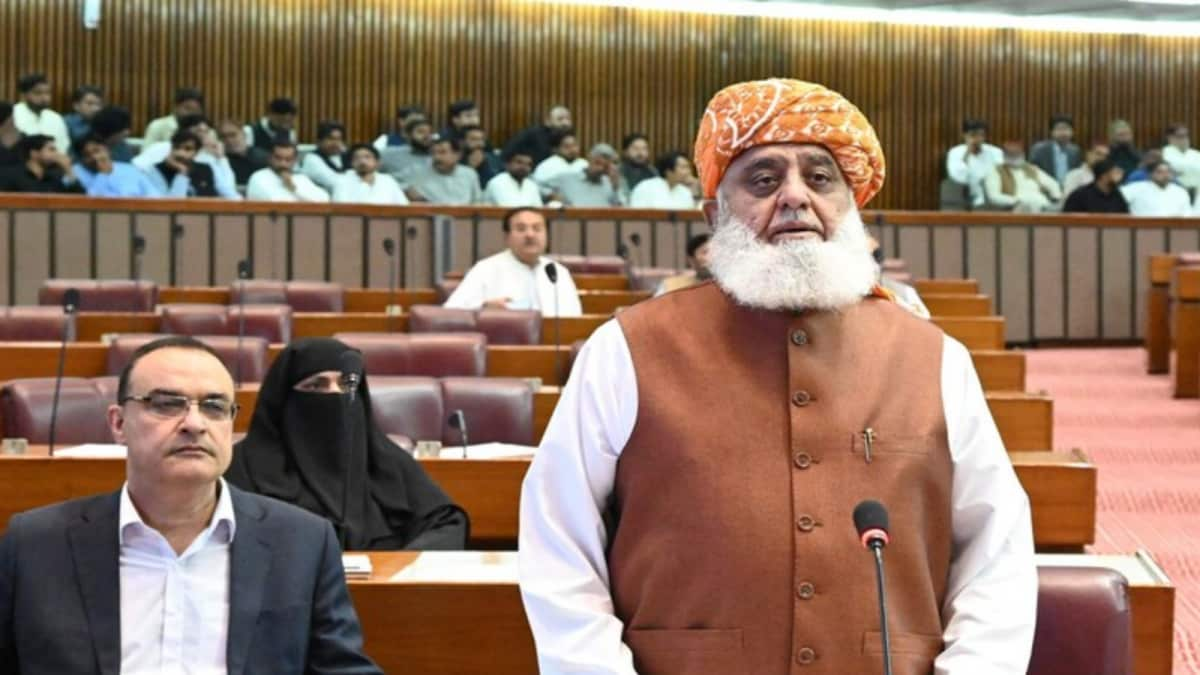Last Updated:
The disclosure was made by Senator Kamran Murtaza, a close aide of Fazlur Rehman. Murtaza claimed that he personally conveyed Maulana’s message of peace to an Indian diplomat.

Jamiat Ulema-e-Islam-Fazl (JUI-F) chief Maulana Fazl-ur-Rehman. (Image: X/naofpakistan)
Jamiat Ulema-e-Islam (F) chief Maulana Fazlur Rehman is keen to visit India with what he calls a “message of peace”. The disclosure was made by Senator Kamran Murtaza, a close aide of Maulana Fazlur Rehman, during a television interview with Pakistani journalist Shaukat Piracha. Murtaza claimed that he personally conveyed Maulana’s message of peace to an Indian diplomat, in the presence of anchor Moeed Pirzada, who also confirmed the exchange.
According to top intelligence sources, the move comes amid growing internal fault lines within Pakistan’s political and military establishment, including rising tensions between Punjabi and Pashtun factions. Top intelligence sources told CNN News18 that the message reflects Maulana’s intent to project himself as a regional peacemaker at a time when relations between India and Pakistan remain tense.
Recommended Stories
According to sources, Maulana Fazlur Rehman — who hails from Dera Ismail Khan and belongs to the Pashtun community — has positioned himself as the political voice of Pashtun discontent. This development, intelligence sources believe, is deeply intertwined with the growing resentment among Pashtun-origin officers and politicians who feel increasingly marginalised under the leadership of Pakistan Army chief General Asim Munir.
Top intelligence sources have told CNN-News18 that a quiet but notable rift has emerged within Pakistan’s power structure, particularly between Punjabi-dominated army leadership and sidelined Pashtun groups. Some mid-level and retired officers of Pashtun origin within the Pakistan Army and ISI are reportedly encouraging Maulana’s “peace narrative,” viewing it as a way to counterbalance Munir’s consolidation of power.
Intelligence sources have also indicated that this initiative could serve multiple objectives. On one hand, Maulana’s proposed visit to India seeks to test New Delhi’s diplomatic reaction to Pakistan’s internal divisions. On the other, it symbolically challenges Munir’s authority, offering a softer, people-centric counterpoint to the military’s hardline stance toward India.
Kamran Murtaza, citing Maulana’s past efforts, noted that the cleric had previously visited India in 2002 and 2003 — times when bilateral relations were equally strained. During those visits, Maulana met with senior political leaders, including Bal Thackeray and members of the NDA government, underscoring his earlier attempts at dialogue.
Intelligence sources also point to a broader backdrop of unease within Pakistan’s security establishment. Officers from Khyber Pakhtunkhwa and Balochistan are said to be opposing Islamabad’s increasingly aggressive posture towards India. These officers reportedly view rising hostility as detrimental to border communities already burdened by instability and poverty.
Sources say Maulana’s peace overture “is not merely symbolic — it’s an indirect signal to both Islamabad and New Delhi that internal discontent in Pakistan’s power corridors is real and growing.”
If the proposal moves forward, intelligence sources believe Maulana’s India visit could mark a subtle but significant shift in Pakistan’s internal dynamics — and a test for India’s diplomatic calculus in the region.
About the Author

Group Editor, Investigations & Security Affairs, Network18
Group Editor, Investigations & Security Affairs, Network18
October 07, 2025, 10:35 IST
Loading comments…
Read More



)